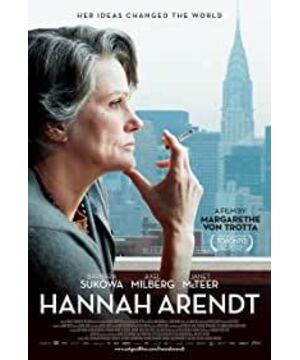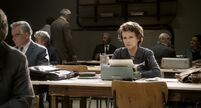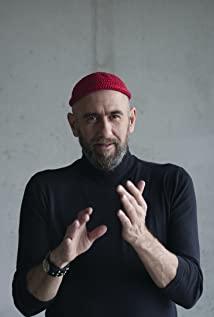The film is actually a bit average, and adding one star is a gift for my own thinking.
Is it the loss of the ability to think, so that you can't distinguish between good and evil, or is obedience and cooperation a conditioned reflex instinct that leads to an extreme evil?
I think that it is not necessarily that the will of the individual is wiped out, but that the individual's belief in committing himself to the community is so strong that he makes the purpose of the community the basis of the whole meaning of his life, and becomes the instrumental man under a thorough system.
I thought that this was a compromise after countless trade-offs under special circumstances, suspending one's precarious destiny in the great void's super-good and evil meteor-like fiery fireworks. This is still a choice, and it should still be paid for.
It does go beyond the dimension of moral evaluation of good and evil, but it is still not allowed by morality. It has to bear the evil consequences of the flowers of evil, not only to bear the evil of a deformed system, but also to disregard the balance of morality again and again for itself. Responsible for the choices made, not to mention the illusion of the ethereal power and glory given by the system, the reward of evil.
Therefore, just looking at the film, I have my own refutation. But I was truly shocked by her heart, and I could not have imagined how much pressure she was facing at that time. She carried the ghosts of six million Jewish people and the hostility and accusations of the living. Her perseverance itself, her determination itself, is worthy of admiration, ruthless and arrogant, left behind and independent.
I was also thinking about it. When I first listened to the triptych reading, and systematically and roughly sorted out her thoughts, I always thought it was unremarkable. From Weber to Bowman to Arendt, all of them have created a rationalized and even extreme institutional shackles, of course, with different orientations. But the stretch of time has lengthened this feeling of pain, turning it into a soft feeling of powerlessness that spreads out in time and space. The lack of Jewish identity makes us a little indifferent at the moment, and a series of speeches such as the so-called bureaucratic system seem to be friendly. Without the pain of death of relatives and friends, facing the Nanjing Massacre, our mourning has also lost a little weight. Even those who think they are sober should be vigilant not to fall into a new round of nationalist "trap". The Jews may be more complicated. They do not have the so-called joy of perseverance and finally raising their eyebrows, but only the tearing that comes from the tragic tragedy. I can't help but wonder, are their spirits still in exile after the founding of Israel?
This is why, I have to admire Hannah's courage, she "represses" her painful feelings, tries to understand rather than forgive, searches for the most incomprehensible code of human nature, and strives to find a trustworthy answer to all large-scale epic tragedies .
However, maybe she didn't actually carry that much, and she never "suppressed" her emotions so much. Jewish identity only gave her the perspective of exile, but did not build kinship. As she said playfully: "All I love is the friends around me." So I thought that this might have created her "coldness" and "arrogance", as well as her observation and thinking. But I also deeply think that this also causes her limitations. If she lacks the sense of belonging to the group from beginning to end, there will be no constructive universal love, but only fragmented extremes towards the common group. Jealousy, or hypersensitivity to the boundaries of power. This is really sad, because it can't find a place in society for people, and the meaning of stability based on individuals is probably very few people can appreciate and appreciate the infinite charm of it.
What I am happy to produce is an inclusive and harmonious community, in the context of having a full appreciation and deep understanding of human nature, still maintaining the belief in interdependence between people and the identity of building a community together. Spiritual exile itself is the ultimate manifestation of the individual's nowhere to live within the community, which shows the great fallacy of society in the exclusion mechanism of unreasonably classifying the real introspective as abnormal. My constructive ideal is naturally shaped by the environment I live in, but I thought it was an excellent gift from God, and I understood it as a kind of luck, which allowed me to have a new historical encounter in the Now that the double fog of individual freedom and collective splendor is gradually receding, I am actively looking for the voice of our time, my own voice. Maintain a moderate amount of vigilance and beneficial trust to discover our earthly mission as citizens within the system.
In the end, I always thought that the criticism and debate about Jewish leaders seemed a bit off topic. At least this was not the core of what I thought Hannah wanted to express, but obviously this just stabbed the kind and fragile heart of the Jewish people. In addition, for Heidegger, I think Hannah made her defense very clear: resistance is difficult, but between resistance and cooperation, there is always a middle state. The teacher she once fell in love with was different and similar to the Jewish leader. Obviously, it went against her creed, and was definitely not a political choice made by him. Therefore, it will be humiliatingly recorded in history as a betrayal of moral personality. file.
I can already foresee the wealth of ideas I can get from her book, which is exciting and motivating to keep my feet on the ground, but I really need to read.
I hope to draw strength from the somber Weber, Bowman, Hannah, and the Foucault I am reading and the Nietzsche I am about to read, to correct the optimistic Durkheim, Rousseau, and oh Tocqueville, to recover from the desolation Find a new way. I can't wait!
Hats off to Hannah!
View more about Hannah Arendt reviews










